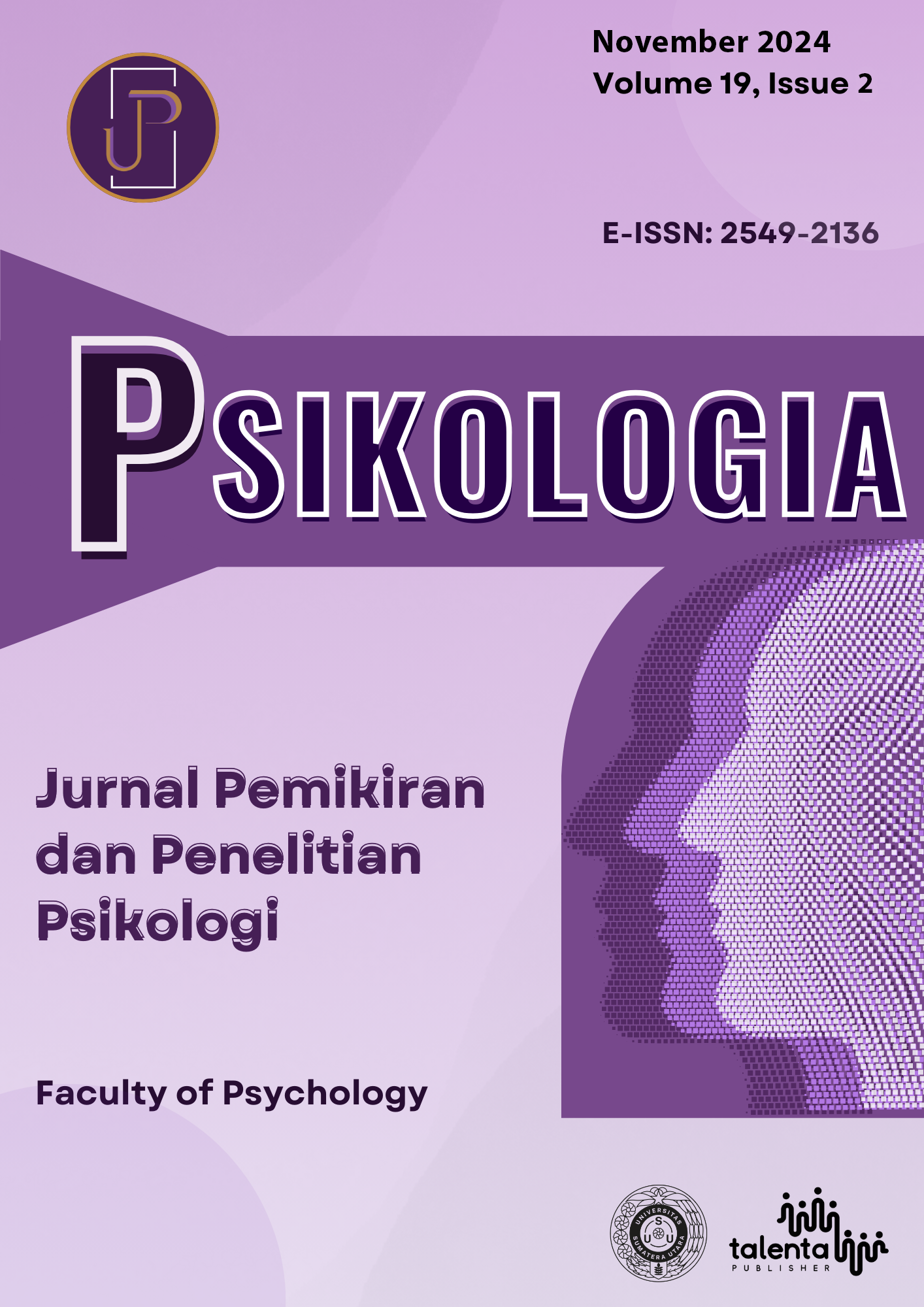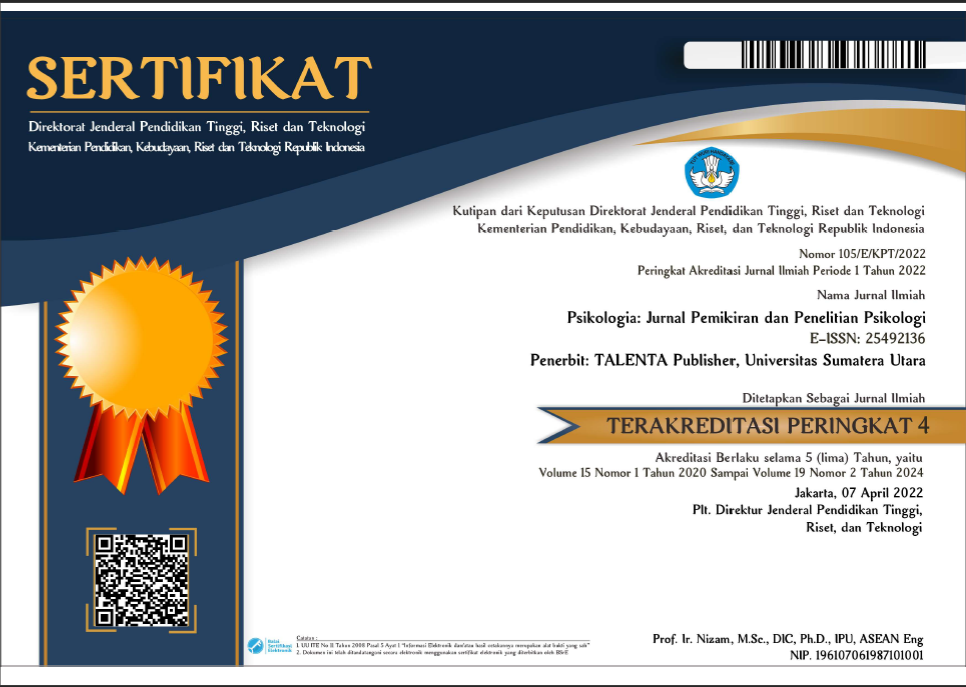The exploration Batak Toba culture based on Schwartz Basic Values Theory: A descriptive analysis of cultural value Dalihan Na Tolu
DOI:
https://doi.org/10.32734/psikologia.v19i2.15632Keywords:
Dalihan Na Tolu, basic value, universalism, self-trancendenceAbstract
Indonesia is a country rich in ethnic and cultural diversity, one of which is the Batak Toba culture. Batak Toba culture places great importance on the philosophy of Dalihan Na Tolu, a traditional framework that emphasizes social harmony and respect. This study explores the relationship between Schwartz’s fundamental human values and the philosophy of Dalihan Na Tolu in Batak Toba culture. The research respondents comprised 143 Batak Toba individuals aged between 16 and 29 years, 44 men and 99 women. The instrument used was the Portrait Values Questionnaire(PVQ-40), adapted to the Indonesian context. The research found that the highest value among Batak Toba people is universalism, with self-transcendence being the dominant value orientation. These fundamental values of universalism and self-transcendence are strongly reflected in the Dalihan Na Tolu philosophy, which emphasizes the importance of maintaining harmony and balance between humans and nature.
Downloads
References
Arianty, U. D., & Rosyadi, E. N. (2023). Perkembangan sistem pembagian waris adat di suku batak toba yang menganut kekerabatan patrilineal. Kultura: Jurnal Ilmu Hukum, Sosial, dan Humaniora, 1(5), 273–277.
Armawi, A. (2008). Kearifan lokal batak toba dalihan na tolu dan good governance dalam birokrasi publik. Jurnal Filsafat, 18(2), 157–166. https://doi.org/10.36805/civics.v1i1.30
Azwar, S. (2016). Reliabilitas dan validitas aitem. Buletin Psikologi, 3(1), 19–26.
Bangun, P. (1993). Kebudayaan Batak†dalam Manusia dan Kebudayaan Indonesia (Koentjaraningrat: ed). Penerbit Jembatan.
Beramendi, M., & Zubieta, E. (2017). Validation of the 40 and 21 items versions of the portrait values questionnaire in Argentina. Psychologia, 60(2), 68–84. https://doi.org/10.2117/psysoc.2017.68
Butarbutar, R. D., Milala, R., & Paunganan, D. D. (2020). Dalihan na tolu sebagai sistem kekerabatan batak toba dan rekonstruksinya berdasarkan teologi persahabatan kekristenan. Dharmasmrti: Jurnal Ilmu Agama dan Kebudayaan, 20(2), 21–28.
Friedenberg, L. (1995). Psychological testing: Design, analysis, and use. Allyn and Bacon.
Haloho, O. (2022). Konsep berpikir suku batak toba: anakkon hi do hamoraon di au. Ideas: Jurnal Pendidikan, Sosial, dan Budaya, 8(3), 747–752.
Harianja, R. F., & Sudrajat, A. (2021). The local wisdom of batak toba through the philosophy of dalihan na tolu in a kinship environment. Budapest International Research and Critics in Linguistics and Education (BirLE) Journal, 4(2), 759–765.
Hilda, L. (2016). Revitalisasi kearifan lokal dalihan na tolu masyarakat muslim mandailing dalam menjaga harmonisasi lingkungan hidup. Jurnal Miqot, 40(1).
Hutagaol, B. E., Simamora, N., & Silitonga, S. (2020). The Study About The Relationship of ‘Dalihan Na Tolu’With Batak Traditional Architecture; Case Study Huta Raja Village Samosir. IOP Conference Series: Earth and Environmental Science, 452(1), 12054.
Lubis, M. N., Joebagio, H., & Pelu, M. (2019). Dalihan na tolu sebagai kontrol sosial dalam kemajuan teknologi. Sejarah dan Budaya: Jurnal Sejarah, Budaya, dan Pengajarannya, 13(1), 25–33.
Marpaung, M. B. (2023). Man and woman identity in dalihan na tolu. International Journal of Humanity Studies (IJHS), 6(2), 264–275.
Matsumoto, D., & Juang, L. (2016). Culture and psychology. Cengage Learning.
Muda, I., & Suharyanto, A. (2020). Analysis of life’s inter-religious harmony based on the philosophy of dalihan na tolu in sipirok sub-district, south tapanuli regency, north sumatera province. Journal of Human Behavior in the Social Environment, 30(5), 533–540.
Nunnally, J. C. (1994). The assessment of reliability. Psychometric theory.
Samosir, T. A., & Pandian, S. (2023). Philosophy of dalihan na tolu as social capital in creating dynamic religious harmony. Migration Letters, 20(9), 151–168.
Schwartz, S. H. (1994). Are there universal aspects in the structure and contents of human values? Journal of Social Issues, 50(4), 19–45. https://doi.org/10.1111/j.1540-4560.1994.tb01196.x
Schwartz, S. H. (2007). Basic human values: theory, measurement, and applications. Revue française de sociologie, 47(4), 929.
Schwartz, S. H. (2012). An overview of the schwartz theory of basic values. Online Readings in Psychology and Culture, 2(1), 1–20. https://doi.org/10.9707/2307-0919.1116
Schwartz, S. H., Cieciuch, J., Vecchione, M., Davidov, E., Fischer, R., Beierlein, C., Ramos, A., Verkasalo, M., Lönnqvist, J.-E., Demirutku, K., Dirilen-Gumus, O., & Konty, M. (2012). Refining the theory of basic individual values. Journal of Personality and Social Psychology (Vol. 103, Nomor 4, hal. 663–688). https://doi.org/10.1037/a0029393
Sibarani, R., Situmorang, H., & Pawiro, M. A. (2018). Concerning toba batak’s local wisdoms and cultural values for regional character building. Indiana Journal of Science and Technology, 11(20).
Sihombing, A. (2018). Mengenal budaya batak toba melalui falsafah. Dalihan Na Toluâ€: Perspektif Kohesi dan Kerukunan. Jurnal Lektur Keagamaan, 16(2).
Simanjuntak, R. M., Kause, M., Siahaan, V. H., Modok, E., & Sagala, Y. (2022). Creating harmony in the dalihan na tolu philosophy for batak people in yogyakarta. Proceedings of the International Conference on Theology, Humanities, and Christian Education (ICONTHCE 2021), 669 (Iconthce 2021), 22–24. https://doi.org/10.2991/assehr.k.220702.006
Sitindjak, R. H. I., Wardani, L. K., & Nilasari, P. F. (2018). Form and meaning of Batak Toba house. 3rd International Conference on Creative Media, Design and Technology (REKA 2018), 207, 273–277.
Sugiono, P. D. (2017). Metode Penelitian Kuantitatif Kualitatif dan R&D. CV. Alfabeta.
Downloads
Published
How to Cite
Issue
Section
License
Copyright (c) 2024 Nurtaty Sinaga

This work is licensed under a Creative Commons Attribution-ShareAlike 4.0 International License.









